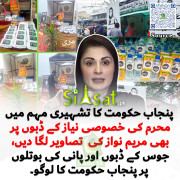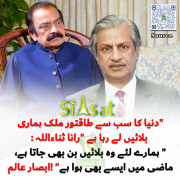yeh mera india
Politcal Worker (100+ posts)
This years floods have brought more devastation to what is now Pakistan than any event since the mass migration and mass murder that accompanied partition in 1947. What happened 63 years ago shaped the fate of this country. So too could the current disaster.
I dont believe the often-repeated claim that the floods mark some great opportunity for terrorist groups. Terrorist groups in Pakistan cannot win in the long run unless they have the tacit support of the state, because these groups have no agenda capable of convincing even a large minority of the people of this country that what they seek is beneficial.
Nor do I believe the floods sow the seeds of a bloody revolution. There are strong signs of discontent in Pakistan, but revolutions require more than discontent: they require an alternate vision people are willing to rally around. Yet Pakistanis seem unenamoured of political models other than our usual constitutional democracy and military dictatorship. Radical notions theocracy, for example, or Maoist populism have little popular support.
Still, the floods could, and should, be transformative. For they reveal to us something from which we Pakistanis do our best to hide.
Our real narrative as a nation is not that of a bulwark of Islam, or of a battlefield in a struggle between great powers, or of an innocent victim bullied by its unreasonable neighbour. After all, in few countries are as many Muslims killed in the name of Islam as ours; the outcome of the duel between China and America does not depend on which way Islamabad tilts; and while India has done much to harm Pakistan, Pakistan has done much to harm India too.
No, the real narrative of Pakistan is one that has nothing to do with the outside world, or geopolitics, or conspiracy theories. The real narrative of Pakistan is the story of a country where a fabulously wealthy elite, as well as a large and growing middle class, refuse to commit sufficiently to helping the majority of their brothers and sisters who remain desperately poor.
The suffering of the Pakistani majority is usually concealed behind sordid dramas enacted by our venal politicians, hypocritical nonsense about our countrys eternal blamelessness, and carefully choreographed nationalistic, ethnic, and sectarian myth-making. But the floods have washed away these illusions and confronted us with our hungry, wet, fearful truth: Pakistan is a land that lets its people suffer.
So now that we can see ourselves as we are, the question is: what will we do?
We can begin by abandoning our mindset of foreign dependency. Yes, aid from abroad is welcome at this terrible time no single country has the resources to deal with a catastrophe on this scale. But our desire for aid should be temporary. We need to start taking care of ourselves. We need to move beyond aid. Long-term aid cripples us. Pakistan needs to help itself. To do this, we need to look at what we already have. We have enormous know-how that can be brought to bear, especially in our giant cities. We have people who understand warehousing, trucking, road-building, vaccination, tent-manufacture. We have people who operate electronic media, customer service centres, hospitals, mobile phone networks. We have massive private homebuilders and school systems and philanthropic networks. Individual Pakistanis have skills and the burning desire to help. What we need is organisation.
Yes, our civilian bureaucracy is struggling to cope, as any countrys would. But Pakistan also has large and well-organised armed forces. Working together, and alongside non-governmental volunteers, a great deal is already being done, and much, much more can and must be.
We should recognise as self-harming the distinction that leads many to say the army is responding well to this disaster and the government poorly. The army and the government are branches of the same thing: the Pakistani state. The army is funded by our taxes, which are raised by our government. And governments pay for armies in part because they are helpful in times like these.
So if the army is at the forefront of the states flood-relief efforts and doing good work, this fact should not be cause for divisive accusations. Instead, we should build on it. Lets have a joint civilian-military natural disaster command. Lets have NGO-army liaison offices to use the armys logistics and planning capacities to help concerned citizens deliver aid as efficiently as possible. Lets have jointly maintained, publicly accessible websites and call centres so people can see whats happening and whats needed. We are one country. Lets act like it.
In a few months, as the emphasis shifts from saving lives to rebuilding livelihoods, the magnitude of what is required of our country long-term will become clear. Twenty million Pakistanis have been affected, one in nine of us. This year they have been undone by the floods. But for 63 years they have been neglected by their more prosperous countrymen and countrywomen. We can see their predicament now, as we watch them on the news, whether from our walled-off mansions or our middle-class apartments. These are families who each had only a few head of animals and a precarious two-room dwelling.
We can no longer pretend they do not exist. Nor can we pretend that what they had before was enough, given our own relative prosperity. Our goal must be not merely to restore their lives to what they were before the floods, but to give them better lives than before the floods. It was one thing to let them suffer out of sight. It is quite another to see them clearly, washed onto the shores of our newspapers and television sets, and still let them suffer.
Helping them means taxes. We pay only a tenth of our collective income to our state, far less than most countries. India and Sri Lanka pay half again as much as we do. We need to pay more. We need a comprehensive flood tax programme. We need to cease our foolish bickering about whether taxes should be paid to the provinces or to the centre, by merchants or by landlords, on luxury goods or on shareholdings. The answer to these either-or questions is both. Lets tax both locally and nationally, both trading and agriculture, both consumption and wealth.
If we can do that, and then spend for the benefit of our impoverished majority, we will earn the right to be hopeful again for Pakistans future. Partition made us a country. The floods must make us a better one.
The writer is the author of the novels Moth Smoke and The Reluctant Fundamentalist.
I dont believe the often-repeated claim that the floods mark some great opportunity for terrorist groups. Terrorist groups in Pakistan cannot win in the long run unless they have the tacit support of the state, because these groups have no agenda capable of convincing even a large minority of the people of this country that what they seek is beneficial.
Nor do I believe the floods sow the seeds of a bloody revolution. There are strong signs of discontent in Pakistan, but revolutions require more than discontent: they require an alternate vision people are willing to rally around. Yet Pakistanis seem unenamoured of political models other than our usual constitutional democracy and military dictatorship. Radical notions theocracy, for example, or Maoist populism have little popular support.
Still, the floods could, and should, be transformative. For they reveal to us something from which we Pakistanis do our best to hide.
Our real narrative as a nation is not that of a bulwark of Islam, or of a battlefield in a struggle between great powers, or of an innocent victim bullied by its unreasonable neighbour. After all, in few countries are as many Muslims killed in the name of Islam as ours; the outcome of the duel between China and America does not depend on which way Islamabad tilts; and while India has done much to harm Pakistan, Pakistan has done much to harm India too.
No, the real narrative of Pakistan is one that has nothing to do with the outside world, or geopolitics, or conspiracy theories. The real narrative of Pakistan is the story of a country where a fabulously wealthy elite, as well as a large and growing middle class, refuse to commit sufficiently to helping the majority of their brothers and sisters who remain desperately poor.
The suffering of the Pakistani majority is usually concealed behind sordid dramas enacted by our venal politicians, hypocritical nonsense about our countrys eternal blamelessness, and carefully choreographed nationalistic, ethnic, and sectarian myth-making. But the floods have washed away these illusions and confronted us with our hungry, wet, fearful truth: Pakistan is a land that lets its people suffer.
So now that we can see ourselves as we are, the question is: what will we do?
We can begin by abandoning our mindset of foreign dependency. Yes, aid from abroad is welcome at this terrible time no single country has the resources to deal with a catastrophe on this scale. But our desire for aid should be temporary. We need to start taking care of ourselves. We need to move beyond aid. Long-term aid cripples us. Pakistan needs to help itself. To do this, we need to look at what we already have. We have enormous know-how that can be brought to bear, especially in our giant cities. We have people who understand warehousing, trucking, road-building, vaccination, tent-manufacture. We have people who operate electronic media, customer service centres, hospitals, mobile phone networks. We have massive private homebuilders and school systems and philanthropic networks. Individual Pakistanis have skills and the burning desire to help. What we need is organisation.
Yes, our civilian bureaucracy is struggling to cope, as any countrys would. But Pakistan also has large and well-organised armed forces. Working together, and alongside non-governmental volunteers, a great deal is already being done, and much, much more can and must be.
We should recognise as self-harming the distinction that leads many to say the army is responding well to this disaster and the government poorly. The army and the government are branches of the same thing: the Pakistani state. The army is funded by our taxes, which are raised by our government. And governments pay for armies in part because they are helpful in times like these.
So if the army is at the forefront of the states flood-relief efforts and doing good work, this fact should not be cause for divisive accusations. Instead, we should build on it. Lets have a joint civilian-military natural disaster command. Lets have NGO-army liaison offices to use the armys logistics and planning capacities to help concerned citizens deliver aid as efficiently as possible. Lets have jointly maintained, publicly accessible websites and call centres so people can see whats happening and whats needed. We are one country. Lets act like it.
In a few months, as the emphasis shifts from saving lives to rebuilding livelihoods, the magnitude of what is required of our country long-term will become clear. Twenty million Pakistanis have been affected, one in nine of us. This year they have been undone by the floods. But for 63 years they have been neglected by their more prosperous countrymen and countrywomen. We can see their predicament now, as we watch them on the news, whether from our walled-off mansions or our middle-class apartments. These are families who each had only a few head of animals and a precarious two-room dwelling.
We can no longer pretend they do not exist. Nor can we pretend that what they had before was enough, given our own relative prosperity. Our goal must be not merely to restore their lives to what they were before the floods, but to give them better lives than before the floods. It was one thing to let them suffer out of sight. It is quite another to see them clearly, washed onto the shores of our newspapers and television sets, and still let them suffer.
Helping them means taxes. We pay only a tenth of our collective income to our state, far less than most countries. India and Sri Lanka pay half again as much as we do. We need to pay more. We need a comprehensive flood tax programme. We need to cease our foolish bickering about whether taxes should be paid to the provinces or to the centre, by merchants or by landlords, on luxury goods or on shareholdings. The answer to these either-or questions is both. Lets tax both locally and nationally, both trading and agriculture, both consumption and wealth.
If we can do that, and then spend for the benefit of our impoverished majority, we will earn the right to be hopeful again for Pakistans future. Partition made us a country. The floods must make us a better one.
The writer is the author of the novels Moth Smoke and The Reluctant Fundamentalist.


































